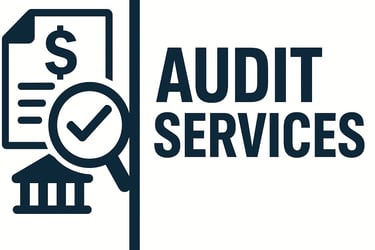

"Audit is the discipline of skepticism, precision, and integrity."
"Assurance gives credibility to information"
Audit & Assurance






Audit is the cornerstone of strong governance in any organization. It plays a critical role in evaluating operational effectiveness and efficiency, while also enhancing internal controls and strengthening investor confidence.
With a balanced blend of technical expertise and industry experience, our team delivers audit and assurance services tailored to the unique needs of each client, helping them stay compliant, transparent, and strategically prepared.
Our Assurance Services Include:
Statutory Audits of large corporations, public sector undertakings, and banks
Tax Audits in compliance with regulatory requirements
Transfer Pricing Audits to ensure arm’s-length pricing and documentation
Internal Audits to evaluate risk management and control frameworks
Investigation Audits for forensic analysis and fraud detection
Audit and Review of Financial Statements under Local GAAP, US GAAP, and IFRS
SOX Attestation in accordance with Sarbanes-Oxley requirements
Agreed-Upon Procedures for specific, client-defined objectives
Certification Services for various statutory and regulatory requirements
Financial Reporting Advisory Services for improved reporting accuracy and transparency
Audits of Trusts, Co-operative Societies, and NGOs
Statutory Audit
In India, statutory audits are audits mandated by law to ensure the accuracy and fairness of financial statements, primarily for companies, banks, and other regulated entities. These are governed by laws such as the Companies Act, 2013, Income Tax Act, and regulations by RBI, SEBI, IRDAI, etc.
Here are the main types of statutory audits in India:
✅ 1. Company Statutory Audit
Mandated by: Companies Act, 2013 (Section 139)
Applicable to: All companies (public and private) registered under the Act
Conducted by: Chartered Accountants (CAs) appointed as statutory auditors
Purpose: To examine the company's books and issue an audit report to shareholders
💼 2. Tax Audit
Mandated by: Section 44AB of the Income Tax Act, 1961
Applicable to: Businesses with turnover > ₹1 crore (or ₹10 crore if digital transactions ≥ 95%), and professionals with receipts > ₹50 lakh
Conducted by: Chartered Accountants
Purpose: To verify income, expenses, deductions, and compliance with tax laws
Outcome: Filing of Form 3CA/3CB and 3CD
🏦 3. Bank Audit
Mandated by: RBI Guidelines under the Banking Regulation Act, 1949
Types:
Statutory Central Audit (SCA): For larger banks; covers core financials
Branch Audit: For large branches; ensures accuracy at branch level
Conducted by: RBI-empaneled CAs
Purpose: To ensure compliance with banking laws and RBI guidelines
🏢 4. Insurance Audit
Mandated by: Insurance Act, 1938 and IRDAI regulations
Applicable to: All insurance companies
Purpose: To audit financial statements and compliance with solvency and reserve norms
Conducted by: Chartered Accountants approved by IRDAI
📈 5. Cooperative Society Audit
Mandated by: State Cooperative Societies Acts or Multi-State Cooperative Societies Act, 2002
Conducted by: CA or auditors empaneled with Registrar of Cooperative Societies
Purpose: To audit accounts of cooperative banks or societies
💹 6. Stock Exchange / SEBI Audit
Mandated by: SEBI and Stock Exchange regulations
Applicable to: Listed companies, brokers, portfolio managers, mutual funds
Types:
Internal/statutory audits for brokers
Half-yearly internal audits for mutual funds
Purpose: Compliance with SEBI regulations
⚖️ 7. GST Audit (Now withdrawn but still relevant historically)
Mandated by: GST Act (Section 35(5)) — till FY 2019–20
Applicable to: Taxpayers with turnover > ₹2 crore
Conducted by: CAs or Cost Accountants
Status: Removed from FY 2020–21 onward, replaced by self-certification of reconciliation statement
🧾 8. Trust Audit
Mandated by: State Public Trust Acts and Income Tax Act
Applicable to: Charitable trusts, especially if claiming tax exemption
Purpose: Ensure proper use of donations and income
Tax Audit
In India, Tax Audit generally refers to the audit conducted under Section 44AB of the Income Tax Act, 1961, but there are multiple types and categories of tax-related audits based on the taxpayer’s nature, income level, and business structure.
Here are the main types of tax audits in India:
✅ 1. Tax Audit under Section 44AB (Main Type)
This is the primary tax audit prescribed under the Income Tax Act.
📌 Applicable When: Category
Criteria: Business Turnover > ₹1 crore (₹10 crore if ≥95% digital receipts/payments)
Profession Gross receipts > ₹50 lakh
🧮 2. Presumptive Taxation Scheme Audit
Though not a separate "audit type," certain presumptive income schemes can require tax audit
if conditions are not met or if the scheme is not followed properly.
Section Description Audit Required When?
44AD Small businesses (turnover ≤ ₹2 crore If income < 8% (or 6% for digital), and total income > basic exemption limit
44ADA Professionals (receipts ≤ ₹50 lakh) If income < 50% of receipts and total income > exemption limit
44AE Goods transport businesses (≤10 vehicles) If opting out or conditions not followed
🏦 3. Transfer Pricing Audit (Section 92E)
📌 Applicable To: International or specified domestic transactions between associated enterprises (AEs)
🔍 Purpose: Ensures arms-length pricing in cross-border or related-party transactions
Note: This is separate from the Section 44AB audit but is also a mandatory "tax audit" in relevant cases.a
🏢 4. GST Audit (Historical)
Though not under the Income Tax Act, it was a statutory tax audit under GST laws for earlier years.
📌 Status: Mandatory GST audit (by CA/CMA) has been withdrawn from FY 2020–21
Internal Audit
Internal audits can be classified into different types based on their focus areas or objectives. Here are the main types of internal audits commonly conducted within organizations:
🔍 1. Financial Audit
Purpose: Reviews the accuracy and integrity of financial records and reporting.
Focus: General ledger, accounts payable/receivable, payroll, and financial controls.
Example: Ensuring that all financial transactions are properly recorded and authorized.
🔄 2. Operational Audit
Purpose: Evaluates the efficiency and effectiveness of business operations.
Focus: Processes, workflows, performance metrics, and resource utilization.
Example: Auditing the supply chain process to reduce delays and costs.
🛡️ 3. Compliance Audit
Purpose: Assesses compliance with internal policies, laws, and regulations.
Focus: Industry-specific rules, legal requirements, and contractual obligations.
Example: Verifying if HR policies comply with labor laws.
⚠️ 4. Risk-Based Audit
Purpose: Focuses on areas of greatest risk to the organization.
Focus: Risk management practices and controls related to strategic, financial, operational, or reputational risks.
Example: Auditing high-risk vendor relationships or major projects.
🖥️ 5. Information Systems (IT) Audit
Purpose: Reviews controls related to information systems and cybersecurity.
Focus: Data integrity, system access, backups, disaster recovery, IT governance.
Example: Checking access logs and permissions for a critical financial software system.
🚨 6. Fraud Audit (or Investigative Audit)
Purpose: Detects and investigates suspected fraud or unethical behavior.
Focus: Anomalies in financial records, policy violations, whistleblower claims.
Example: Investigating suspicious vendor payments flagged by the finance team.
📈 7. Performance Audit
Purpose: Evaluates whether resources are used effectively and economically.
Focus: Cost-effectiveness, quality of service delivery, and productivity.
Example: Reviewing a department’s budget use versus its outcomes.
🌐 8. Environmental, Social & Governance (ESG) Audit
Purpose: Assesses compliance with ESG goals and sustainability initiatives.
Focus: Environmental impact, labor practices, governance structures.
Example: Auditing energy use or diversity and inclusion reporting.
🗂️ 9. Follow-Up Audit
Purpose: Determines whether corrective actions from previous audits have been implemented.
Focus: Specific findings and recommendations from prior audits.
Example: Rechecking procurement processes after issues were identified.
Forensic Audit
Forensic audits around the world are specialized audits conducted to detect, investigate, and prevent fraud, financial misconduct, or criminal activity. They are used by corporations, governments, regulators, and legal systems.
Here are the main types of forensic audits worldwide, categorized by their focus or purpose:
🗂️ Summary Table
Type of Forensic Audit Focus Area Common Users
Financial Statement Fraud Accounting manipulation Regulators, investors
Asset Misappropriation Theft of cash, inventory, resources Companies, nonprofits
Corruption and Bribery Illegal payments, unethical deals Governments, watchdogs
Tax Fraud Evasion, false returns Tax departments
Bankruptcy Forensics Insolvency-related fraud Creditors, courts
Money Laundering Tracing illicit funds Banks, financial regulators
Cyber Forensics Digital fraud and cybercrimes IT firms, cybercrime units
Insurance Fraud False insurance claims Insurance companies
M&A Forensics (Due Diligence) Hidden fraud in target companies Acquiring firms, investors
Procurement Fraud Contract irregularities Public sector, NGOs
🌍 Major Types of Forensic Audits
1. Financial Statement Fraud Audit
Focus: Detect manipulation or falsification of financial statements
Examples:
Overstating revenue
Hiding liabilities
Common in: Public companies, especially those under stock exchange scrutiny
2. Asset Misappropriation Audit
Focus: Investigate theft or misuse of an organization’s assets
Examples:
Embezzlement
Skimming cash
Misuse of company credit cards
Common in: SMEs, nonprofits, and large corporations
3. Corruption and Bribery Audit
Focus: Identify illegal payments or kickbacks to gain an unfair advantage
Examples:
Bribing government officials
Fraudulent vendor relationships
Common in: Government contracts, international trade, construction
4. Tax Fraud Audit
Focus: Investigate intentional misreporting of taxes or evasion
Examples:
Underreporting income
Fake deductions or offshore accounts
Handled by: Tax authorities like IRS (USA), HMRC (UK), or CBDT (India)
5. Bankruptcy or Insolvency Forensic Audit
Focus: Examine causes of bankruptcy or suspected fraudulent transfers before insolvency
Used for:
Identifying preferential payments
Proving director misconduct
Common in: Corporate bankruptcies and restructuring
6. Money Laundering and Financial Crime Audit
Focus: Trace illegal funds and suspicious transactions through the financial system
Tools used: AML software, transaction analysis
Used by: Financial intelligence units (e.g., FINCEN, FIU-India)
7. Cyber Forensic Audit (Digital Forensics)
Focus: Investigate financial crimes using digital evidence
Examples:
Hacking financial records
Email scams, ransomware attacks
Used by: Cybercrime units, tech-driven businesses
8. Insurance Fraud Audit
Focus: Investigate fraudulent insurance claims
Examples:
Fake accidents
Inflated health claims
Common in: Health, auto, and life insurance sectors
9. Due Diligence Forensic Audit (M&A Investigations)
Focus: Uncover hidden liabilities or fraud in mergers & acquisitions
Purpose: Protect buyer's interest during corporate deals
10. Contract and Procurement Fraud Audit
Focus: Detect collusion, bid rigging, and kickbacks in procurement
Examples:
Inflated contract pricing
Phantom vendors
Common in: Government projects, NGOs, constructiona
Certification Services
In India, Chartered Accountants (CAs) are authorized to issue various certifications required under different laws and regulations, primarily governed by the Institute of Chartered Accountants of India (ICAI). These certifications are essential for businesses, individuals, and organizations for regulatory compliance, taxation, financial reporting, fundraising, and statutory audits.
Below is a categorized list of the types of Chartered Accountant certifications in India:
🧾 1. Tax-Related Certifications
Certification Purpose
Tax Audit Report (Form 3CD) Mandatory under Section 44AB of the Income Tax Act
Transfer Pricing Certificate (Form 3CEB) Required under Section 92E for international/domestic related-party transactions
Certification for TDS Compliance Verifying correct deduction and deposit of TDS
Certificate of Computation of Book Profit (MAT) For companies paying Minimum Alternate Tax under Section 115JB
Certification of Income for Visa or Remittance Required under Section 195 for foreign remittances (Form 15CB)
🏛️ 2. Statutory & Regulatory Certifications
Certification Purpose
Statutory Audit Report Required under the Companies Act for all companies
Certification of Financial Statements Attesting that accounts present a true and fair view
Net Worth Certificate For loans, tenders, immigration, or franchise applications
Turnover Certificate For bidding in government tenders or bank loan applications
Working Capital Certificate Often required by banks for credit limit approvals
🏢 3. Company Law Certifications
Certification Purpose
Certification under Section 92 (Annual Return) Filing of MGT-7 (Annual Return) by companies
Certification under Section 137 (Financials) Filing AOC-4 (Financial Statements) with ROC
Share Valuation Certificate For issuance of shares, mergers, or startup funding (under Companies Act and FEMA)
Certification of Internal Controls & Governance For corporate governance compliance and audits
💱 4. FEMA / RBI Related Certifications
Certification Purpose
Foreign Remittance Certificate (Form 15CB) Required for outward remittance of foreign exchange
Certification of ECB Utilization For use of External Commercial Borrowings as per RBI norms
FIRC / FDI Reporting Certifications For inward remittances and compliance with RBI guidelines
🏥 5. Certifications for NGOs and Trusts
Certification Purpose
Audit Report under Section 12A/80G For charitable trusts and NGOs claiming tax exemption
Utilization Certificate For grants received from government or donors
Corpus Fund Certification To confirm the nature and use of funds received
📈 6. Project Finance & Bank Certifications
Certification Purpose
Projected Financials Certificate For loan proposals or investment evaluations
Fund Flow / Cash Flow Statement Certification Used by banks to assess liquidity and viability
Certificate of End Use of Funds To confirm that loan funds were used for approved purposes
DSCR Certificate (Debt Service Coverage Ratio) For assessing creditworthiness in banking proposals
📋 7. Miscellaneous Certifications
Certification Purpose
CA Certificate for Startup Valuation Required by startups for investor reporting and DPIIT recognition
Capital Gains Calculation Certificate For sale of property or shares
Certification for Merger / Demerger / Amalgamation Used in schemes submitted to NCLT or ROC
Inventory Valuation Certificate For banks, insurance claims, or legal proceedings
